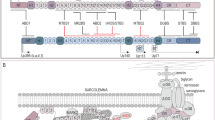Abstract
Mutations in the dystrophin gene result in Duchenne muscular dystrophy (DMD), a progressive muscle-wasting disease. Adeno-associated virus (AAV) mediated gene replacement, and CRISPR/Cas9-mediated genome editing hold the potential to treat DMD. Molecular and biochemical analyses are essential to determine gene transfer efficiency and therapeutic efficacy. In this chapter, we present a series of methods routinely used in our laboratory to extract and quantify DNA, RNA, and protein in gene therapy studies performed in the canine DMD model.
Access this chapter
Tax calculation will be finalised at checkout
Purchases are for personal use only
Similar content being viewed by others
References
Kunkel LM (1989) The Wellcome lecture, 1988. Muscular dystrophy: a time of hope. Proc R Soc Lond B Biol Sci 237(1286):1–9
Duan D (2016) Systemic delivery of adeno-associated viral vectors. Curr Opin Virol 21:16–25. https://doi.org/10.1016/j.coviro.2016.07.006
Duan D (2018) Systemic AAV micro-dystrophin gene therapy for Duchenne muscular dystrophy. Mol Ther 26(10):2337–2356. https://doi.org/10.1016/j.ymthe.2018.07.011
Shin J-H, Pan X, Hakim CH et al (2013) Microdystrophin ameliorates muscular dystrophy in the canine model of Duchenne muscular dystrophy. Mol Ther 21(4):750–757. https://doi.org/10.1038/mt.2012.283
Yue Y, Pan X, Hakim CH et al (2015) Safe and bodywide muscle transduction in young adult Duchenne muscular dystrophy dogs with adeno-associated virus. Hum Mol Genet 24(20):5880–5890
Le Guiner C, Servais L, Montus M et al (2017) Long-term microdystrophin gene therapy is effective in a canine model of Duchenne muscular dystrophy. Nat Commun 8:16105. https://doi.org/10.1038/ncomms16105
Hakim CH, Pan X, Kodippili K et al (2016) Intravenous delivery of a novel micro-dystrophin vector prevented muscle deterioration in young adult canine Duchenne muscular dystrophy dogs. Mol Ther 24(Suppl 1):S198–S199
Hakim CH, Kodippili K, Jenkins G et al (2018) AAV micro-dystrophin therapy ameliorates muscular dystrophy in young adult Duchenne muscular dystrophy dogs for up to 30 months following injection. Mol Ther 26(S1):5
Wang Z, Kuhr CS, Allen JM et al (2007) Sustained AAV-mediated dystrophin expression in a canine model of Duchenne muscular dystrophy with a brief course of immunosuppression. Mol Ther 15(6):1160–1166
Duan D (2018) Micro-dystrophin gene therapy goes systemic in Duchenne muscular dystrophy patients. Hum Gene Ther 29(7):733–736. https://doi.org/10.1089/hum.2018.012
Mendell JR, Sahenk Z, Lehman K et al (2020) Assessment of systemic delivery of rAAVrh74.MHCK7.micro-dystrophin in children with Duchenne muscular dystrophy: a nonrandomized controlled trial. JAMA Neurol. https://doi.org/10.1001/jamaneurol.2020.1484
Solid Biosciences (2021) solid biosciences reports efficacy and safety data from the ongoing IGNITE DMD clinical trial and resumption of patient dosing in the 2E14 vg/kg cohort, March 15. https://investors.solidbio.com/news-releases/news-release-details/solid-biosciences-reports-efficacy-and-safety-data-ongoing
Pfizer (2020) Pfizer’s new phase 1b results of gene therapy in ambulatory boys with Duchenne muscular dystrophy (DMD) support advancement into pivotal phase 3 study, May 15. https://investors.pfizer.com/investor-news/press-release-details/2020/Pfizers-New-Phase-1b-Results-of-Gene-Therapy-in-Ambulatory-Boys-with-Duchenne-Muscular-Dystrophy-DMD-Support-Advancement-into-Pivotal-Phase-3-Study/default.aspx
Amoasii L, Hildyard JCW, Li H et al (2018) Gene editing restores dystrophin expression in a canine model of Duchenne muscular dystrophy. Science 362(6410):86–91. https://doi.org/10.1126/science.aau1549
Hakim CH, Kumar SRP, Perez-Lopez DO et al (2021) Cas9-specific immune responses compromise local and systemic AAV CRISPR therapy in multiple dystrophic canine models. Nat Commun 12(1):6769. https://doi.org/10.1038/s41467-021-26830-7
Biase FH, Franco MM, Goulart LR et al (2002) Protocol for extraction of genomic DNA from swine solid tissues. Genet Mol Biol 25(3):313–315
Kodippili K, Vince L, Shin JH et al (2014) Characterization of 65 epitope-specific dystrophin monoclonal antibodies in canine and murine models of Duchenne muscular dystrophy by immunostaining and western blot. PLoS One 9(2):e88280. https://doi.org/10.1371/journal.pone.0088280
Hakim CH, Wasala NB, Nelson CE et al (2018) AAV CRISPR editing rescues cardiac and muscle function for 18 months in dystrophic mice. JCI Insight 3(23):124297. https://doi.org/10.1172/jci.insight.124297
Hakim CH, Clement N, Wasala LP et al (2020) Micro-dystrophin AAV vectors made by transient transfection and herpesvirus system are equally potent in treating mdx mouse muscle disease. Mol Ther Methods Clin. ev 18:664–678. https://doi.org/10.1016/j.omtm.2020.07.004
Acknowledgments
The research on the canine DMD model in the Duan lab is currently supported by the National Institutes of Health (NS-90634 and AR-70517), Jesse Davidson Foundation-Defeat Duchenne Canada, Hope for Javier, Jackson Freel DMD Research Fund, Parent Project Muscular Dystrophy, Jett Foundation, Michael’s Cause, Ryan’s Quest, Solid Biosciences Inc., and the University of Missouri.
Disclosure
DD is a member of the scientific advisory board for Solid Biosciences and equity holders of Solid Biosciences. DD is a member of the scientific advisory board for Sardocor Corp. In the last 3 years, the Duan lab has received research supports unrelated to this project from Solid Biosciences and Edgewise.
Author information
Authors and Affiliations
Corresponding author
Editor information
Editors and Affiliations
Rights and permissions
Copyright information
© 2023 The Author(s), under exclusive license to Springer Science+Business Media, LLC, part of Springer Nature
About this protocol
Cite this protocol
Hakim, C.H., Pérez-López, D., Burke, M.J., Teixeira, J., Duan, D. (2023). Molecular and Biochemical Assessment of Gene Therapy in the Canine Model of Duchenne Muscular Dystrophy. In: Maruyama, R., Yokota, T. (eds) Muscular Dystrophy Therapeutics. Methods in Molecular Biology, vol 2587. Humana, New York, NY. https://doi.org/10.1007/978-1-0716-2772-3_15
Download citation
DOI: https://doi.org/10.1007/978-1-0716-2772-3_15
Published:
Publisher Name: Humana, New York, NY
Print ISBN: 978-1-0716-2771-6
Online ISBN: 978-1-0716-2772-3
eBook Packages: Springer Protocols




